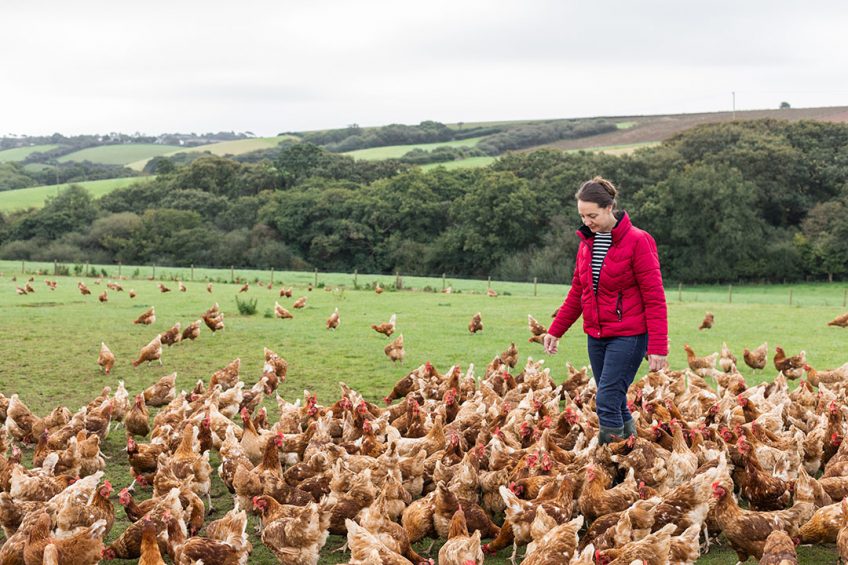Omega-3 from algae for nutritious eggs

Fish oil is a traditional source of omega-3, but due to limited global annual production, there is a deficit. A new source needs to bridge this gap.
Algae are helping to fill the omega-3 supply gap and delivers health benefits to egg consumers.
Most health organisations across the world recommend a minimum daily intake for healthy adults of 200mg of omega-3 in our diet, but with a growing world population of over 7 billion people, demand is at an all-time high, and innovative and sustainable solutions are required to fill this void. Long chain omega-3s are types of fatty acids our bodies need to function and have many health benefits for the heart, brain, and immune system. Omega-3s in layer poultry diets not only bring significant health advantages to the hens but can also transfer these benefits to the consumer via their eggs.
Vegetable source omega-3
UK manufacturer of energy, protein and omega-3 supplements UFAC-UK has developed a sustainable, environmentally friendly, vegetable source of the omega-3 fatty acid DHA (docosahexaenoic acid) using algae rather than fish oils. “Algi18DHA is a traceable, sustainable, high-quality alternative to fish-oil-sourced omega-3s,” explains UFAC-UK national sales manager, Nigel Bateson. “It is a free-flowing meal of algae oil from native Schizochytrium species. It contains a minimum of 18% omega-3 DHA in the biomass and is easy to incorporate in feeds.” Crucially, this DHA translates directly from the hens to their eggs, bringing benefits to the consumer. “DHA brings many benefits, including blood pressure and heart rate reduction, and aids vascular health. It also raises good cholesterol and improves cognitive health, and we are keen to develop ways of passing these benefits through the food chain to the consumer,” adds Mr Bateson.
Early adopter
Working with progressive suppliers and innovative egg producers and farmers, UFAC-UK has been able to transfer these nutritional benefits to the end consumer in the UK. A notable early adopter of this sustainable source of omega-3 is UK-based St Ewe Eggs, situated in Cornwall. Packing 1 million eggs per week in total, St Ewe Eggs wanted to push the boundaries and develop a super nutritious everyday egg, specifically for the health and wellness market.
 Can algae residuals be used in chicken feed?
Can algae residuals be used in chicken feed?
Belgian researchers are using residues from algae production for human food to assess their application in chicken feed. This idea looks promising.
Working with poultry specialists, Humphrey Feeds & Pullets, St Ewe Eggs had identified the traceability and nutritional benefits of algae, providing high levels of DHA. Owner Rebecca Tonks worked with Humphrey Feeds & Pullets to develop a scientifically-based feed using algae-sourced omega-3 in combination with selenium, a naturally occurring mineral and 1 of 13 essential minerals needed to maintain health and boost immune support. “Selenium and fatty acids are 2 beneficial ingredients in human diets, so it seemed obvious to put them together,” says Rebecca. “The growth rate of algae is phenomenal, so it’s a sustainable source of DHA omega-3. The health benefits for humans are huge: consuming the omega-3 in egg form, as opposed to tablet or supplement form, means more can be gained because the human body can break it down and store it in human tissue.”
Super eggs
Working with its own nutritionists and the Humphrey’s team, St Ewe created different feed blends on site, trialling different levels of selenium and algae until they got the formulation right. It was Humphrey Feeds & Pullets that had put Rebecca in touch with UFAC-UK, who were able to supply the algae via the Algi18DHA product. Martin Humphrey, sales director at Humphrey Feeds & Pullets explains: “It is always a positive and thought-provoking experience working with Rebecca from St Ewe Eggs, as she is determined to create a great egg brand positively differentiated by enhancements to her eggs. We worked closely with UFAC-UK, and their team has been particularly helpful in creating a specific premix which meets the nutritional objectives of St Ewe’s Super Eggs.”
 Eggs developed for the health and wellness market
Eggs developed for the health and wellness market
UK-based St Ewe Eggs has launched a “super-nutritious” everyday egg specifically designed for the health and wellness market.
Now confident of their feed formulation following these trials, Rebecca is keen to further develop the new Super Eggs range. So far, 29,000 of the 189,000 laying hens are on the Super Egg diet, producing approximately 152,000 Super Eggs per week out of the 1 million eggs packed weekly. Although still in its infancy, the Super Egg brand is gaining traction with the focus very much on the immune and antioxidant support benefits, as well as improving heart health through DHA omega-3. The Super Eggs are sent off for nutritional testing every 12 weeks to ensure St Ewe’s claims are correct: that a serving of 2 Super Eggs provides the consumer with 75% of the reference intake (RI) of selenium and 65% of DHA omega-3. This testing helps manage feeding in different seasons, ensuring the eggs still contain the required nutrients throughout summer and winter. St Ewe Eggs will work with Humphreys and UFAC-UK to develop the range and adapt formulations as required.
Supplying 100 supermarkets
At present, St Ewe supplies 100 Tesco supermarkets across the UK, as well as smaller retailers locally in Cornwall and, via a UK food company, farm shops throughout the country. Although costing more to produce, margins are similar to other eggs if not slightly more, as they sell for more by promoting the health benefits. St Ewe wants to help improve the public’s health and wants to make Super Eggs accessible and affordable for all. Nigel Bateson concludes: “This is an exciting and rewarding project, and we look forward to working with Rebecca and Martin as this range and brand develops, providing a fully traceable and sustainable source of omega-3, as well as other sources of nutrition important for a balanced diet. It also aligns strongly with our environmental focus and credentials at UFAC-UK, and we welcome Rebecca’s drive to push these health benefits in such an innovative way.”
Author: Juliette Tompkins












